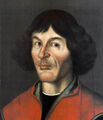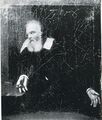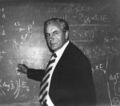Template:On This Day (nonfiction)/February 19
1473: Mathematician and astronomer Nicolaus Copernicus born. He will formulate a model of the universe that places the Sun rather than the Earth at the center of the universe.
1596: Cryptographer and diplomat Blaise de Vigenère dies. The Vigenère cipher was misattributed to him; Vigenère himself devised a different, stronger cipher.
1600: The Peruvian stratovolcano Huaynaputina explodes in the most violent eruption in the recorded history of South America.
1616: The Inquisition asked a commission of theologians, known as qualifiers, about the propositions of the heliocentric view of the universe after Nicollo Lorin had accused Galileo Galilei of heretical remarks in a letter to his former student, Benedetto Castelli.
1799: Mathematician, physicist, and sailor Jean-Charles de Borda dies. He contributed to the development of the metric system, constructing a platinum standard meter, the basis of metric distance measurement.
1897: Mathematician and academic Karl Weierstrass dies. He will be cited as the "father of modern analysis".
1919: Mathematician and academic Alexander Andreevich Samarskii born. Samarskii will contribute to applied mathematics, numerical analysis, mathematical modeling, and finite difference methods.
1946: Mathematician and academic Alan Turing presents the "Proposal for the Development in the Mathematics Division of an Automatic Computing Engine (ACE) to a meeting of the Executive Committee of the National Physical Laboratory (NPL); the proposal will be approved at a second meeting held a month later.
2016: Novelist, literary critic, and philosopher Umberto Eco dies. He cited James Joyce and Jorge Luis Borges as the two modern authors who have influenced his work the most.
2017: Mathematician and dissident Igor Shafarevich dies. He made fundamental contributions to algebraic number theory, algebraic geometry, and arithmetic algebraic geometry.









